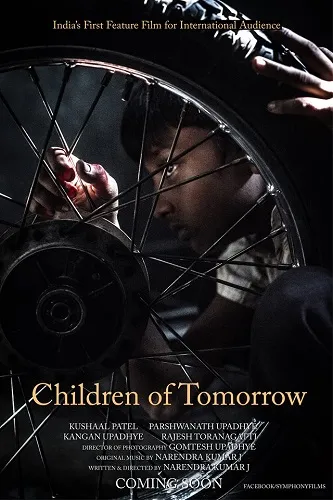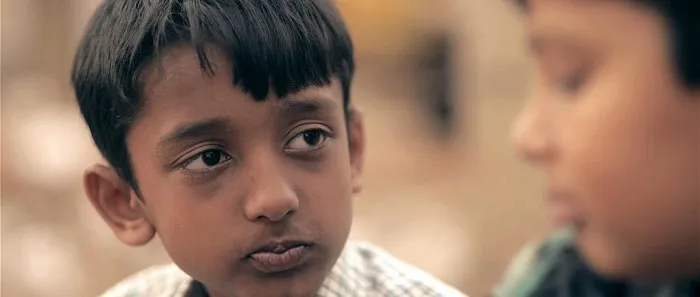How two ex techies are working to give 'The Children of Tomorrow' a fighting chance
When the local service station messed up Narendra J’s bike repair he was angry. So he went in there and demanded to speak to the person who had done such a shoddy job. The ‘person’ turned out to be a scared, quivering boy of eleven whose little hands were smeared with tar and gasoline. The boy looked terrified of the punishment that awaited him. Equally worse was the attack of conscience that bike owner was reeling from.
Soon after Narendra and his friend Gomtesh quit their plush IT jobs in Bangalore and bootstrapped to create Symphony Films- a small film company committed to telling stories that matter.
Their latest offering is Children of Tomorrow, a searing look at the gritty lives such children lead. In the past YourStory has written about the experiences of street children who overcame insurmountable odds to make something amazing of their lives. While such stories make for wonderful inspirations, it is worthwhile to remember that may be one or two among millions manage to live such lives. The rest rot away in the deep dark hole where we have pushed them into. With Children of Tomorrow the filmmakers are hoping to open eyes, changes lives and jolt us to act. Narendra speaks to YourStory about the curious case of starting up, why there was no alternative to making this film, how difficult the process is and what the future holds- both for Symphony Films and the children of tomorrow.
How did Symphony Films come to be created?
When I used to work in a corporate (IT) job, I used to travel with my colleague Gomtesh Upadhye in our daily office transport and because of Bangalore's traffic and also the distance, we had around 3 hours for to and fro journey every day at our disposal. We used to talk about varied subjects during this. Since he was also into photography and I was into playwriting and theatre, we used to discuss about films, film making and related creative pursuits.

We were at regular paying jobs. However we were not content with our creative skills not being utilized. After a couple of years and a long contemplation, I decided that I had to follow my gut. I was aware that it would be an immense challenge, taking risks every day and the thought of not having a regular paying job troubled me. I think this moment of truth to decide is very important in everyone's life and their career/life depends on the decision they take at this point. I gathered enough courage and quit the corporate job in order to pursue creative aspirations and then I was in the process of deciding the next steps. A few months later Gomtesh followed suit and we haven’t looked back since.
Was the Children of Tomorrow inspired by a real life subject?
Yes. A few years back I had gone to get my bike back from a local service station. After I saw the bike I was disappointed with their quality of work. I went to speak to the person who had done the service and was directed to a little eleven year old boy. When I saw him that was a moment of epiphany. Of a strong realization that when a kid at his age has lost his childhood, we as a society have failed him.
What has been some of the toughest challenges and sacrifices you’ve had to endure in the process of filming Children of Tomorrow?

Raising funds for the film has been very difficult and remains our toughest challenge. As film is shot without the usual commercial elements like songs, dance, etc., we are not able to get individuals acting as producers for the film. Most feel returns may be risky on investment of this kind.
What has been the response to the movie on social media? Have any critics or reviewers given you their feedback?
Since we are an indie film, our budget for marketing is non-existent. But we have received immense love and support on social media and for that we feel gratified.
Pawan Kumar, renowned Kannada film director has supported our film by generously letting us shoot at his location. Also he has promoted our campaign on his social media sites. Sruthi Hariharan, Kannada film actor has generously donated to the campaign and promoted the campaign on social media.
If any critics or viewers would like to see the film, we are happy to oblige.
What concrete short term goals are you hoping to achieve by releasing this movie?
We want to create important conversations about child labour and the horrible such life little children endure right under the nose of civilised society. Also we want regular people out there to know that anyone can make a film. Established filmmakers do not have a monopoy on this domain. If you have a story to tell, and you think this is the right medium to tell it, then irrespective of who you are and where you come from you can make a film.
We want to create a community of such likeminded people who can collaborate, co-create and share their skills and resources with each other to create a wonderful ecosystem of meaning and purpose.
Why film in English?
Child Labour is a universal issue and we would like our film to reach out to all those people who appreciate an endeavour based on this subject across the world. Also currently in regional languages this kind of realistic filmmaking is not appreciated and would be ignored as ‘art films.’ We feel that ‘Children of Tomorrow’ being in English would be appreciated by all regional demographics in India, as it is one of the most common languages, and we also would like the film to reach global audience in maximum number.
If your campaign does not make it, do you have a contingency plan?
As our film does not have private producers, we will have to make it up to the extent of funds that we were able to raise. But it may not achieve as much the quality that we had originally planned. We sincerely hope our campaign will be successful.
What other ideas for films/projects does Symphony Films have in its kitty?
We would like to make more realistic feature films on various realistic, social, intellectual and biographical subjects.
What has been the best part about starting work on this movie?
The best part about making the film 'Children of Tomorrow' is the spirit of collaboration that we are able to receive. People from various walks of life have come together for a cause that has no monetary gain for them. It is amazing how this common connection can be achieved if we put together an honest, collaborative and socially beneficial pursuit.
Check out the campaign here







